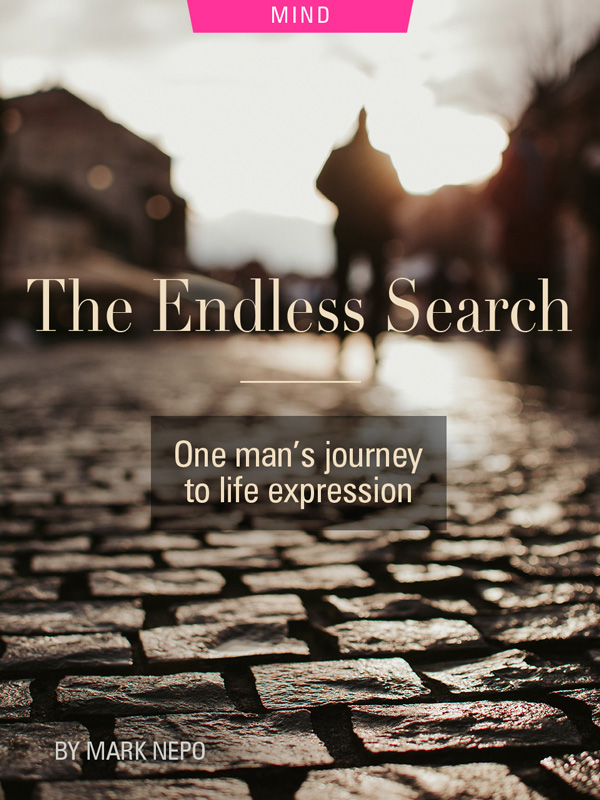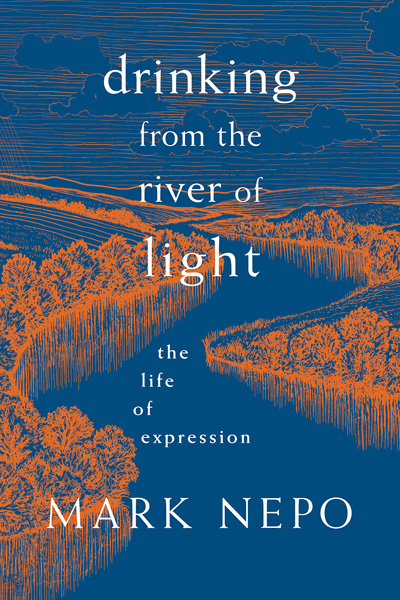
How we can inhabit a lifelong practice of listening, expressing and creating to animate our souls
_
Such is my poetry: ironwork-poetry…
It is not a poetry thought out bit by bit.
It is not a beautiful produce, not a perfect fruit.
It is something like the air we all breathe
and the music of space we carry, deep inside.
~ Gabriel Celaya
As soon as we are born, we are part of an endless search that really goes nowhere. But it’s the journey and movement of the search that enlivens us. The great Hindu sage, Ramana Maharshi said, “There is no greater mystery than this, that we keep seeking reality though in fact we are reality.”
It is through this endless seeking that effort reveals grace. It is through the endless search that life moves through us until we realize that heaven is wherever we are, if we meet life completely with an open heart.
And just as moving through water keeps fish alive, moving through life brings our indwelling presence into the world. Moving through life allows meaning to accumulate through relationship. As some fish swim with no destination, we arrive with a yearning that has no destination, a search that keeps us alive, despite the thousand places we think we need to go.
But we are not fish. And as no one can survive the ocean without a vessel to carry them, even the sea of Spirit will drown us, if we don’t create vessels to carry us.
A fundamental purpose of creativity is to engage us in the creation of vessels that will carry us in the sea of Spirit, in which we need to immerse ourselves to make life meaningful.
My poems and books are the boats that carry me, that keep me close to the deep where I am most alive.
Inherently, will and surrender are the oars that steer the soul, working gifts that return us to the heart of what matters. And along the way, we are drawn into the search for whole-mind thinking, which is revealed through the life of metaphors; the search for belonging, which is revealed through the life of stories; and the search for authenticity, which is revealed through the life of poetry.
The search for whole-mind thinking reflects our inborn urge to regain Unity. And nothing brings the Wholeness of Reality into view more than the life of metaphors. For the more we see, the greater our chance at experiencing wisdom. And the more we feel, the greater our chance at experiencing compassion.
Each soul is a cell in the bloodstream of humanity and, as such, each soul is indispensable to the health of life. For without healthy cells, there can be no bloodstream. And without a healthy bloodstream, there is no place for cells to live. This is a metaphor that evokes whole-mind thinking.
A covenant that appears for being on the endless search is that we become committed to the art of putting things together. In the 1600s, the Japanese master Basho spoke about this to his student, Kikakou:
We shouldn’t abuse God’s creatures.
You must reverse your haiku.
Not:
a dragonfly;
remove its wing —
pepper tree.
But:
pepper tree;
add wings to it—
dragonfly.
The world depends on which way this thought unfolds. The metaphors we come upon lead us to whole-mind thinking, which reminds us to put things together rather than take things apart.
Our search for belonging is brought forward through the life of stories, as narratives are the threads that bind us.
Once we know a person’s story, we tend to experience kinship over separation and to offer praise more than blame. I’m thinking of a woman I know who after the death of her lifelong friend was drawn to wear her friend’s sweater when all alone in the afternoon. She slowly began to feel the one, long story of women who were friends throughout the ages. She closed her eyes and began to feel the clothes and jewelry they all had shared.
I’m also thinking of being nine and watching my father in his basement workshop carefully building a model sailing ship, so immersed in using a tweezer to set the miniature rigging that I could sense the story of everyone who ever built a sailing ship in the quiet of our basement.
Or when I was in the Jewish Cemetery in Prague, watching an old man put his hand heavily on a family stone. Though I didn’t know the details of his loss, I stood close enough in silence to share in his mourning, and felt the endless story of loss and mourning reverberate around us. Stories of belonging restore our sense of kinship.
I’m often asked about the difference between my efforts in poetry and prose. In poetry, I have always searched for metaphors that reveal how everything is connected, how everything is informed and enlivened by the same Source. The further I go, the more I realize that in writing prose I’m taking those inscrutable, compelling metaphors and I am entering them, living with them, being in relationship and conversation with them; trying to retrieve and unfold the logic of Spirit nested within them. This is the basis for the spiritual nonfiction that I write. This is what rises in me when I try to release in prose what’s carried to me in poetry.
Finally, there is the search for authenticity, which is the bedrock of all our searching.
For no matter where we go, none of it matters, unless we are real. And poetry is the chief means of discovering and expressing authenticity. Because poetry offers us a direct way to live in truth. The poetry of authenticity can connect us to the wholeness of humanity and the mystery of the Universe at any time in any way. Poetry is the honest record of our days.
I’m thinking of the time in Washington Park when I saw an elderly man staring off into Eternity. Having seen me see him, he came over and sat beside me, and asked, “How can we go there together?” That question changed my life. Or the time I saw a homeless boy in South Africa, begging with such dignity that it made me explore all the ways my heart has been broken open through the years. Or that time in the hospital after having a cancerous rib removed from my back, when the doctor suddenly came to remove the tube siphoning blood from my lungs. Sitting at the foot of my bed, my dear friend Paul jumped to my side so I could hold on to him. That moment uncovered the essential step we all must take, if we are to love. These were authentic moments that revealed the poetry of life.
Ultimately, you can grunt your truth and it will still be beautiful. For the deeper sense of beauty is the shine of authenticity more than the aesthetic qualities that stun us. No matter how awkward, our authenticity is the foundation of lasting beauty. If someone coughs “I love you,” it’s more beautiful than an unfelt love sung in perfect pitch.
In the same way that no one can quench your thirst by drinking for you, drinking of life directly is the only way to stay essential and substantial.
______
An Invitation into Whole-Mind Thinking
- In your journal, take a metaphor, one you’ve read or discovered yourself, and describe the whole-mind thinking it draws you into.
- In conversation with a friend or loved one, tell a story that demonstrates our struggle to belong. Later, weave the story you have told into a story that you write.
- In your journal, write a poem about a recent moment of authenticity you found yourself in.
[This article is an excerpt from Mark’s new book, Drinking from the River of Light, just published by Sounds True.]
You may enjoy reading other pieces by Mark Nepo for Best Self Magazine on his author page.
